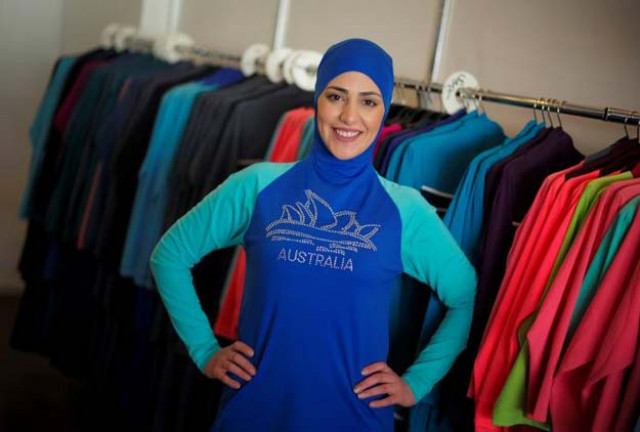Burkini gave women freedom, creator says
Many French cities have banned the burkini for being ‘incompatible’ with French values

Model Salwa Elrashid models a 'burkini', designed by Lebanese-born Australian Aheda Zanetti at her fashion store in Sydney, August 23, 2016. PHOTO: REUTERS
But amidst all that furore what usually escapes attention is the idea behind the full body garment. Australian-Lebanese designer Aheda Zanetti, who claims the trademark on the name burkini and burqini, shares, "When I invented the burkini in early 2004, it was to give women freedom, not to take it away.” Writing an op-ed in The Guardian, she says she first thought about creating the costume when she saw her niece playing netball in “a skivvy, tracksuit pants, and her hijab, totally unsuitable for any type of sport.”
French police make woman resting on Nice beach remove 'burkini'
“So I went home and went looking for something that might be better for her to wear, sportswear for Muslim girls, and I couldn’t find anything, I knew there was nothing in Australia. It got me thinking because when I was a girl I missed out on sport – we didn’t participate in anything because we chose to be modest, but for my niece I wanted to find something that would adapt to the Australian lifestyle and western clothing but at the same time fulfil the needs of a Muslim girl,” she writes.
So she decided to design and launch one herself. “A lot of people in my community didn’t know how to accept this, but I developed it commercially and made a good business.”
According to Zanetti, the burkini came to everyone’s attention when Surf Life Saving Australia introduced a programme to integrate Muslim boys and girls into surf lifesaving after the Cronulla riots. However, she says, “After September 11, the Cronulla riots, the banning of the veil in France, and the international backlash that came with it – about us being the bad people all because of a few criminals who do not speak on behalf of Muslims – I really didn’t want anyone to judge girls wearing these. It’s only a girl being modest.”
For the creator of burkini, the garment is about integration, acceptance and being equal. “It was difficult for us at the time, the Muslim community, they had a fear of stepping out. They had fear of going to public pools and beaches and so forth, and I wanted girls to have the confidence to continue a good life. Sport is so important, and we are Australian! I wanted to do something positive – and anyone can wear this, Christian, Jewish, Hindus. It’s just a garment to suit a modest person, or someone who has skin cancer, or a new mother who doesn’t want to wear a bikini, it’s not symbolising Islam.”
More non-Muslims buying burkinis as France enforces ban
She also revealed why she called it the burkini. “When I named it the burkini I didn’t really think it was a burqa for the beach. Burqa was just a word for me – I’d been brought up in Australia all my life, and I’d designed this swimsuit and I had to call it something quickly. It was the combination of two cultures – we’re Australians but we are also Muslim by choice. The burqa doesn’t symbolise anything here, and it’s not mentioned in the Quran and our religion does not ask us to cover our faces, it’s the wearer’s choice to do so. Burqa is nowhere in any Islamic text. I had to look the word up, and it was described as a kind of coat and cover-all, and at the other end you had the bikini, so I combined the two.”
Zanetti questioned the French ban on burkinis, saying that the garment has been misunderstood as it symbolises leisure, happiness, fun and fitness. “This has given women freedom, and they want to take that freedom away? So who is better, the Taliban or French politicians? They are as bad as each other.”
And she says she would love to be in France to say, “You have misunderstood. And there more problems in the world to worry about, why create more? You’ve taken a product that symbolised happiness and joyfulness and fitness, and turned it into a product of hatred.”
She recalls how the first time she went swimming in public was when she wore a burkini. “It was my first time swimming in public and it was absolutely beautiful. I remember the feeling so clearly. I felt freedom, I felt empowerment, I felt like I owned the pool. I walked to the end of that pool with my shoulders back.”
“Diving into water is one of the best feelings in the world. And you know what? I wear a bikini under my burkini. I’ve got the best of both worlds.”
This article originally appeared on The Guardian.


















COMMENTS
Comments are moderated and generally will be posted if they are on-topic and not abusive.
For more information, please see our Comments FAQ